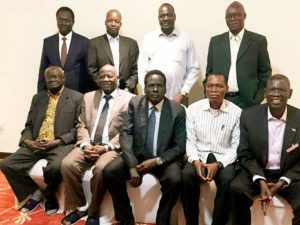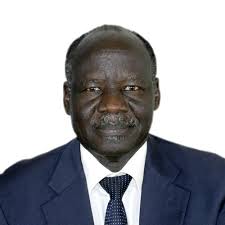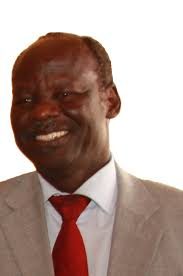Why SSOA is not signing the Khartoum deal on governance

Khartoum, July 30, 2018 – South Sudan Opposition Alliance has raised four issues of contention in the Khartoum Agreement on governance as being the main obstacles to them initialing the deal. Last week, the government, the SPLM-IO and other stakeholders signed a preliminary deal on power sharing. However, opposition parties under the South Sudan Opposition Alliance group refused to sign.
The deal on governance and responsibility sharing – gave the position of the First Vice President back to Dr. Riek.
It also indicated that the current government will own 55 percent of the political ratio in the states and local government; the SPLM-IO with 27 percent; while other Political Parties with 10 percent, and 8 percent to the rest.
SSOA wants the positions split, 55% for the government, while “45% is left for the opposition groups to divide among themselves.” According to this arrangement, the next transitional government will accommodate 5 Vice Presidents, 35 Ministers, 32 States, and 550 members of the National Legislative Assembly. But Dr Lam Akol, Gabriel Changson, Joseph Bakasoro, Deng Alor, among others described the current document as unrealistic.
“The power sharing at the state levels has to be inclusive, but that is not [our] main issue,” said Dr. Lam. According to the leaders of the South Sudan Opposition Alliance and the Former Political Detainees , there are disagreeable issues with the fromation of the Independent Boundary Commission, IBC, the proposed referendum, and the management of funds.
On the referendum, Dr. Lam Akol said the exercise to determine the number of states is unachievable. The agreement says the exercise shall be conducted 5 months into the agreement, during the pre-transitional period. “In the pre-transition period, it is the current government that is still in office. So it will be the one organizing the referendum, it will have the opportunity to campaign, and it will be the one also in control of the security organs – and we know what happened in 2010,” said Dr. Lam.
In 2010, Dr. Lam Akol was the only Presidential candidate to contest against President Salva Kiir in the Sudan’s General Elections. He accused GoSS of intimidating his supporters, and party agents during the electioneering year.
“We think that there is no way this could be done within the pre-interim period, because who is going to be responsible for that? It is the current government, the rest will not be there,” Deng Alor told Eye Radio in Khartoum.
Mr. Alor added the formation of the National Pre-Transition Committee, NPTC, which is to deal with the task that are to be done within the pre-transition period gives President Salva Kiir the powers to appoint the committee members. He said they prefer IGAD to appoint the members of the committee.
The Opposition Alliance is further opposed to the number of representatives in the IBC, in which the government has 5, while opposition groups have 5. In order for a decision to pass, 7 votes from South Sudanese members of the IBC is required.
“Suppose that the opposition presents a joint position, and pursued the African countries [representatives], you will have 10 [votes]. That makes 2/3 majority. But then it needs 2 other South Sudanese so that they are 7 [votes], where do you get that? From the government? No way,” said Dr. Lam Akol. “If the opposition has a proposal, the government [team] will shoot it down by mere absence of 2 votes.”
The FDs and the opposition group also rejects the proposed management of funds for the committee in which the government is expected to control the wiring of money to the account of the NPTC.
The opposition group wants the donor and money from the oil proceeds to be delivered directly into the account of the committee rather than through the government. “This money should be managed by an independent body that will be responsible for funding all the projects during the interim period,” said Deng Alor. He however said they may sign the peace agreement, and later discuss the pending issues during the transitional period.















